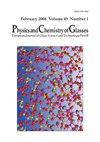Corrosion resistance of CaO–Al2O3–SiO2 glasses used for flame spraying on concrete
IF 0.3
4区 材料科学
Q4 CHEMISTRY, PHYSICAL
Physics and Chemistry of Glasses-European Journal of Glass Science and Technology Part B
Pub Date : 2020-02-21
DOI:10.13036/17533562.61.1.05
引用次数: 0
Abstract
Concrete components can severely suffer from corrosion during their service lifetime. To achieve higher durability, glass coatings can be applied onto the concrete surface for protection purposes. Current solutions for protection measures are either sticking thin glass panes onto the concrete or applying plastic layers using flame spraying. The aim of this work was to develop an optimised glass composition for protective layers, in order to be suitable for flame spraying on concrete. The main advantage of this process is the deposition of continuous and joint-free glass layers onto complex geometries. Dense glass layers provide a much higher corrosion resistance and lifetime compared to polymer layers. The challenge encountered by these glass coatings resides in the contact with strong acidic fluids on one side and with the alkaline concrete on the other. Therefore, a new glass appropriate for flame spraying has been developed. The composition of this glass is cheaper compared to established reference glass products while providing comparable alkaline resistance. As the acid resistance of this glass is not sufficient, in order to ensure the desired requirements of an adequate corrosion protection, a multilayer glass coating was developed, in which the first layer consists of the alkaline-resistant CaO–Al2O3–SiO2 glass and the second layer of an acid-resistant glass.混凝土火焰喷涂用CaO-Al2O3-SiO2玻璃的耐腐蚀性能
混凝土构件在其使用寿命期间会受到严重的腐蚀。为了获得更高的耐久性,可以在混凝土表面涂上玻璃涂层以起到保护作用。目前的保护措施要么是在混凝土上粘贴薄玻璃板,要么是使用火焰喷涂的塑料层。这项工作的目的是为保护层开发一种优化的玻璃成分,以便适用于混凝土上的火焰喷涂。该工艺的主要优点是在复杂的几何形状上沉积连续且无接缝的玻璃层。与聚合物层相比,致密的玻璃层具有更高的耐腐蚀性和使用寿命。这些玻璃涂层所面临的挑战在于一边与强酸流体接触,另一边与碱性混凝土接触。因此,开发了一种适合火焰喷涂的新型玻璃。与现有的参考玻璃产品相比,这种玻璃的成分更便宜,同时提供相当的耐碱性。由于这种玻璃的耐酸性能不佳,为了保证足够的防腐蚀要求,开发了多层玻璃涂层,其中第一层由耐碱性CaO-Al2O3-SiO2玻璃组成,第二层由耐酸玻璃组成。
本文章由计算机程序翻译,如有差异,请以英文原文为准。
求助全文
约1分钟内获得全文
求助全文
来源期刊

CiteScore
0.70
自引率
33.30%
发文量
0
审稿时长
1 months
期刊介绍:
Physics and Chemistry of Glasses accepts papers of a more purely scientific interest concerned with glasses and their structure or properties. Thus the subject of a paper will normally determine the journal in which it will be published.
 求助内容:
求助内容: 应助结果提醒方式:
应助结果提醒方式:


